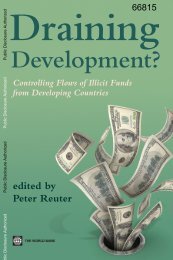rural-urban dynamics_report.pdf - Khazar University
rural-urban dynamics_report.pdf - Khazar University
rural-urban dynamics_report.pdf - Khazar University
You also want an ePaper? Increase the reach of your titles
YUMPU automatically turns print PDFs into web optimized ePapers that Google loves.
68 MACROECONOMIC, TRADE, AND AID DEVELOPMENTS GLOBAL MONITORING REPORT 2013<br />
FIGURE 1.21 Total number of measures<br />
implemented and still in force by each G-20<br />
country, November 2008–December 2012<br />
Saudi Arabia<br />
Mexico<br />
Japan<br />
Korea, Rep.<br />
Australia<br />
Canada<br />
South Africa<br />
Turkey<br />
United States<br />
Indonesia<br />
Italy<br />
Brazil<br />
Germany<br />
France<br />
United Kingdom<br />
India<br />
China<br />
Argentina<br />
Russian Federation<br />
EU-27<br />
0 50 100 150 200 250 300<br />
Total<br />
Liberalizing or transparency improving measures<br />
Likely to be restrictive and discriminatory against<br />
foreign commercial interests<br />
Restrictive and discriminatory against foreign<br />
commercial interest<br />
Source: Global Trade Alert database.<br />
Note: Individual measures may cover a very large portion of trade or just<br />
one product—these data are therefore not necessarily reflective of trade<br />
coverage. For example, Mexico reduced tariffs on 5,000 tariff lines, but this<br />
is reflected in just a few “measures.”<br />
Limited progress in Doha Round<br />
negotiations at the WTO<br />
The need for multilateral agreement remains<br />
critical to mitigate the use of trade restrictive<br />
measures and promote trade openness. However,<br />
the prospects for successfully concluding<br />
the Doha Development Agenda (DDA) negotiations—now<br />
entering their twelfth year—<br />
remain dim, with recent <strong>report</strong>s that WTO<br />
members have turned their attention in 2013<br />
to “realistic” deliverables, 14 rather than a<br />
conclusion to the whole round. The deadlock<br />
is costly. In terms of the market access dimension<br />
of what has been negotiated to date,<br />
there is a potential global welfare boost of<br />
some $160 billion at stake (Hoekman 2011).<br />
But often overlooked is the opportunity cost<br />
of the WTO not being able to deliver on its<br />
“legislative” function as an arbiter of new<br />
rules of the game in policy matters outside<br />
the framework of the DDA. These include<br />
“green” industrial policy measures, natural<br />
resource- and climate-related trade policies<br />
(such as carbon border adjustments), and<br />
export restrictions on food products to insulate<br />
domestic markets. DDA paralysis carries<br />
the risk of countries pursuing unilateral,<br />
potentially damaging, responses to the externalities<br />
of these policies.<br />
According to experts, much could be<br />
gained if a critical mass of the 15–20 or so<br />
largest WTO members were to agree to<br />
reduce applied barriers to trade and bind<br />
current levels of openness, but currently<br />
some large countries want more than other<br />
large countries are willing to offer (Hoekman<br />
2011). Over the course of 2012, topics<br />
including trade facilitation, agriculture, special<br />
and differential treatment, least developed<br />
country issues, and dispute settlement<br />
were advanced—according to the chairs of<br />
the various Doha negotiating groups—while<br />
others, like services, barely moved at all, and<br />
are unlikely to move forward in the months<br />
ahead. Successful negotiations at the upcoming<br />
December 2013 ninth ministerial conference<br />
in Bali are being viewed as a pivotal<br />
stepping stone—and necessary precondition—for<br />
ending the Doha Round, though<br />
there is little optimism that the conference<br />
itself will end the round (ICTSD 2012). At<br />
the most recent World Economic Forum in<br />
Davos, trade ministers from over 20 WTO<br />
member countries gathered informally and<br />
imposed an unofficial Easter deadline for<br />
taking stock of whether “meaningful results”<br />
in Bali will be possible. They agreed that success<br />
at the conference would have to include<br />
gains in the areas of trade facilitation, leastdeveloped<br />
country issues, and agriculture<br />
(ICTSD 2013).

















